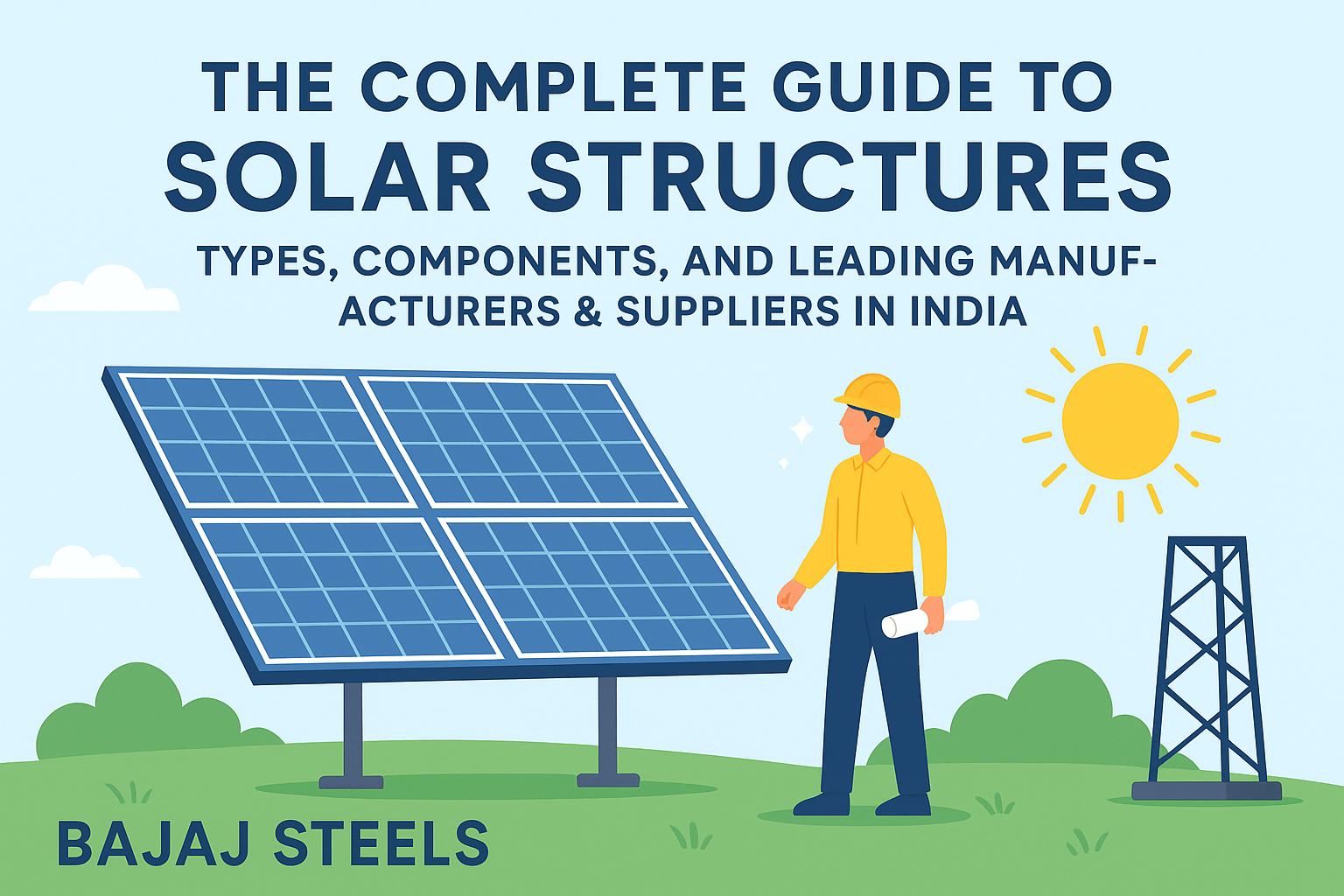The Complete Guide to Solar Structures in India with Bajaj Steels: Types, Components & Supplier…

India’s solar industry is growing at an unprecedented pace, driven by ambitious renewable energy targets and rising industrial adoption. At the core of every successful solar project lies one crucial element — the solar structure. These mounting systems form the backbone of rooftop, ground-mounted, and utility-scale solar power plants, ensuring stability, efficiency, and durability for decades.
For industrial buyers and EPC contractors, selecting the right solar structure manufacturer or solar structure supplier is just as important as choosing the panels themselves. In this guide, we’ll explore the types of solar mounting systems, their key components, material choices, and why trusted brands like Bajaj Steels are preferred across India.
Why Solar Structures are Important
A solar mounting framework does much more than hold panels in place. It ensures:
- Stability — Withstands wind, rain, and seismic forces.
- Efficiency — Keeps panels at the correct tilt for maximum sunlight capture.
- Durability — Protects performance against corrosion and environmental stress.
Without a high-quality solar structure, even the best panels can lose efficiency or fail prematurely, leading to reduced ROI in industrial projects.
Types of Solar Mounting Systems
Different projects demand different solutions. Here are the major types:
1. Fixed-Tilt Solar Structures
Simple and cost-effective, these systems keep panels at a constant angle. They are ideal for warehouses and industrial sites with consistent sun exposure.
2. Adjustable-Tilt Solar Structures
Allow seasonal tilt adjustment to optimize yield in regions with varying sun paths. Popular for industrial rooftops in North India.
3. Ground-Mounted Solar Structures
Installed with foundations or pile-driven supports, these are scalable for large-scale farms and institutional setups.
4. Rooftop Solar Structures
Lightweight designs for flat or sloped roofs, widely used in factories and commercial complexes.
5. Solar Tracking Systems
Advanced systems that move panels with the sun’s path, boosting generation by 15–25%. Best suited for high-investment projects.
Key Components of Solar Structures
Each part of a solar mounting system plays a role in safety and longevity. Industrial buyers should pay attention to:
- Rafters — Load-bearing beams that transfer weight.
- Purlins — Horizontal supports for alignment.
- Columns & Base Plates — Provide stability in rooftops and ground-mounted setups.
- Solar Clamps (mid and end) — Hold panels securely against wind uplift.
- Jointers & Degree Clamp Holders — Ensure structural continuity and proper angles.
- Fasteners, Spring Nuts, LN Bolts, Washers — Essential for strong and quick assembly.
Material Choices for Durability
The lifespan of a solar mounting structure largely depends on the material and coating. Common options include:
- Pre-Galvanized Steel — Cost-effective, widely used for rooftops.
- Hot Dip Galvanized Steel — Best corrosion resistance, suitable for harsh climates.
- Galvalume Steel — Aluminum-zinc alloy, long-lasting and mid-cost.
- Magsure — Advanced alloy with self-healing properties, ideal for coastal regions.
Leading Solar Structure Manufacturer in India — Bajaj Steels
When it comes to industrial reliability, Bajaj Steels is one of the most trusted solar structure suppliers in India. With decades of expertise in the power transmission and distribution sector, the brand offers precision-engineered mounting systems designed for performance and durability.
Why Choose Bajaj Steels?
- Comprehensive Range — From rafters, purlins, clamps, base plates, jointers, and fasteners, everything is available under one roof.
- Material Excellence — Expertise in pre-galvanized, hot dip galvanized, GP, and galvalume solar structures.
- Customization — Tailored designs for industrial rooftops, utility-scale projects, and unique site layouts.
- Fast Delivery — Guaranteed 24-hour delivery across UP, saving project time and costs.
- Nationwide Supply — Trusted by EPCs, industrial buyers, and commercial complexes across India.
Buying Considerations for Industrial Solar Projects
Before choosing a solar structure supplier, evaluate:
- Durability — Material quality and galvanization type.
- Design Compatibility — Panel type, roof load, and site geography.
- Ease of Installation — Modular, prefabricated designs save time.
- Supplier Reputation — Delivery reliability and after-sales support.
- Cost vs. Lifespan — Balance upfront cost with long-term returns.
Final Thoughts
A solar structure is not just a support system; it’s a performance driver for your solar plant. From fixed-tilt frames to tracking systems, every design and component impacts efficiency, durability, and ROI.
For industrial buyers in India, working with a trusted partner like Bajaj Steels ensures high-quality materials, quick delivery, and customized solutions. By choosing the right solar mounting system, you safeguard your investment and secure sustainable energy generation for decades.
- AI
- Vitamins
- Health
- Admin/office jobs
- News
- Art
- Causes
- Crafts
- Dance
- Drinks
- Film
- Fitness
- Food
- الألعاب
- Gardening
- Health
- الرئيسية
- Literature
- Music
- Networking
- أخرى
- Party
- Religion
- Shopping
- Sports
- Theater
- Wellness


